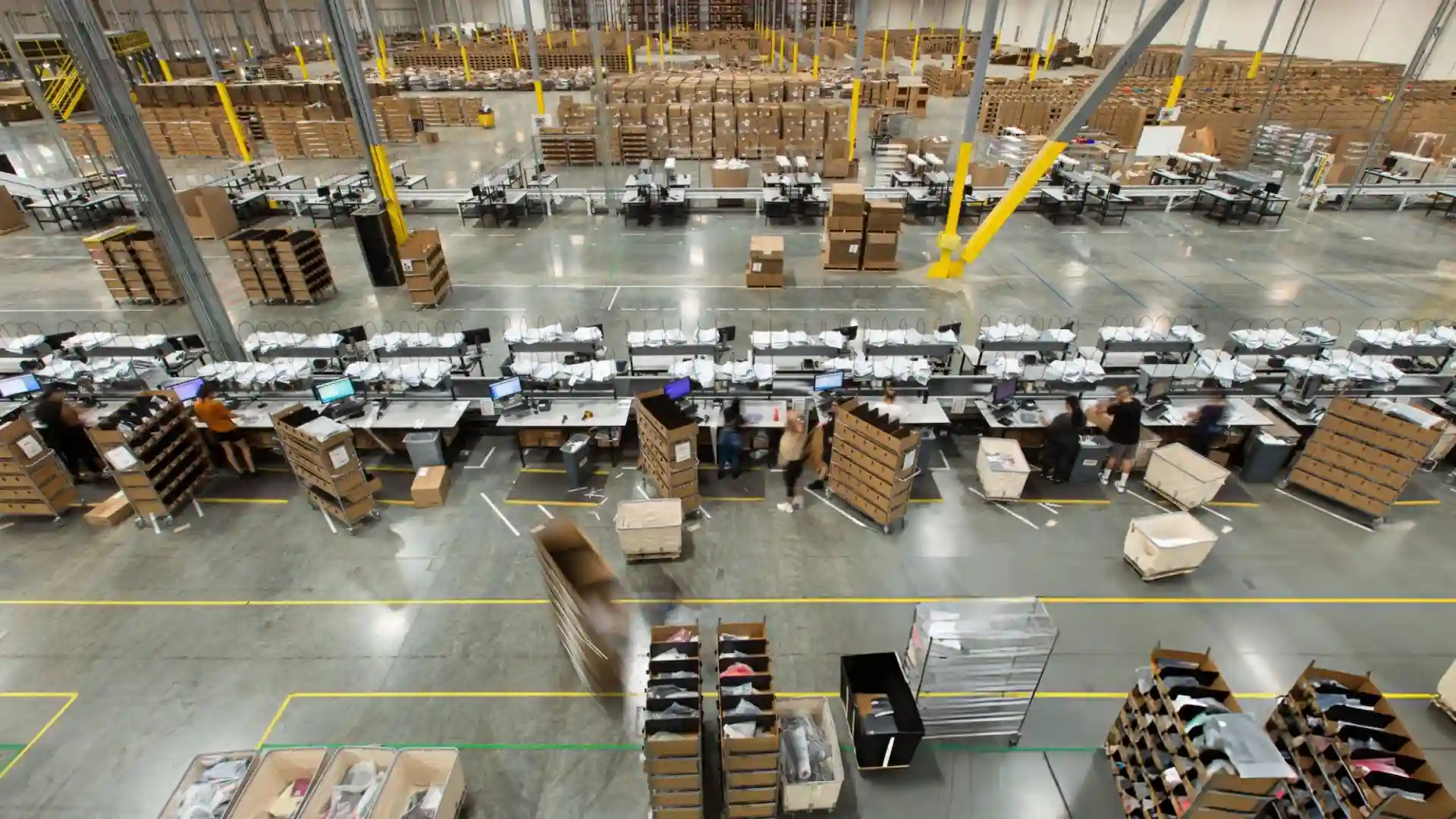How to Optimize Your E-Commerce Supply Chain for Faster Delivery Times
.webp)
Optimizing your supply chain for faster delivery times is crucial in e-commerce, where customer expectations are higher than ever. Effective supply chain management ensures products move smoothly from suppliers to customers, enhancing overall customer satisfaction and driving business growth. This blog will explore strategies and best practices for optimizing e-commerce logistics, improving delivery speed, and achieving efficient and effective order fulfillment.
Understanding Supply Chain Management in E-Commerce
What is Supply Chain Management in E-Commerce?
Supply chain management in e-commerce involves coordinating various logistics processes, such as procurement, production, inventory management, warehousing, and transportation, to ensure that products move smoothly from suppliers to customers. Effective supply chain management minimizes costs, improves delivery times, and enhances overall customer satisfaction.
Why is Supply Chain Management Important for E-Commerce Businesses?
For any e-commerce business, supply chain management is crucial to maintaining a competitive edge. It helps businesses manage inventory efficiently, streamline the fulfillment process, and ensure fast deliveries. A well-optimized supply chain contributes to better order accuracy, reduced costs, and higher customer satisfaction, which are vital for sustaining growth in a competitive market.
Key Components of Supply Chain Management
- Inventory Management: Proper inventory management ensures that the right products are available at the right time. This reduces stockouts and overstock situations, optimizing the fulfillment process.
- Warehouse Automation: Implementing automation technologies in warehouses can streamline operations, reduce human error, and increase efficiency.
- Transportation Management: Efficient transportation management ensures that products are delivered to customers in a timely and cost-effective manner.
- Last Mile Delivery: The final leg of the delivery process, known as last mile delivery, is critical for meeting customer expectations. Optimizing this step can significantly impact overall delivery times.
Strategies for Delivery Optimization
Improving delivery speed requires a comprehensive approach that involves multiple aspects of the supply chain. Here are some strategies to consider for improving efficiency:
1. Implementing Advanced Logistics Technology
Utilizing the latest logistics technology can enhance supply chain performance and reduce delivery times. Technologies such as IoT (Internet of Things), AI (Artificial Intelligence), and blockchain can provide real-time visibility into the supply chain, enabling better decision-making and faster response times.
2. Enhancing Warehouse Automation
Warehouse automation involves the use of robotics, automated storage and retrieval systems (AS/RS), and conveyor systems to streamline warehouse operations. Automation can significantly reduce the time taken for picking, packing, and shipping orders.
- Robotics: Automated robots can handle repetitive tasks such as picking and sorting, reducing labor costs and increasing efficiency.
- AS/RS: These systems automate the storage and retrieval of goods, minimizing human intervention and speeding up the fulfillment process.
3. Optimizing Inventory Management
Effective inventory management ensures that products are available when needed, without overstocking. Techniques such as Just-In-Time (JIT) inventory and demand forecasting can help achieve this balance.
- JIT Inventory: This approach reduces inventory holding costs by receiving goods only as they are needed for production or sales.
- Demand Forecasting: Using historical data and market trends to predict future demand helps in maintaining optimal inventory levels.
4. Improving Transportation Management
Transportation management is a critical aspect of e-commerce logistics. Efficient management of transportation can reduce delivery times and costs.
5. Focusing on Last Mile Delivery
Last mile delivery is often the most challenging and costly part of the supply chain. Strategies to improve last mile delivery include:
- Local Fulfillment Centers: Establishing fulfillment centers closer to customers can reduce delivery times.
- Crowdsourced Delivery: Leveraging local couriers and delivery services can provide flexible and fast delivery options.
- Delivery Tracking: Providing customers with real-time tracking information enhances transparency and improves customer satisfaction.
Integrating Supply Chain Strategy for E-Commerce Success
A well-integrated supply chain strategy aligns all elements of the supply chain to work towards common goals. This involves collaboration among suppliers, manufacturers, and logistics providers to ensure seamless operations.
Key Elements of a Successful Supply Chain Strategy
- Collaboration: Foster strong relationships with suppliers and logistics partners to ensure smooth communication and coordination.
- Flexibility: Adapt to changes in demand and supply conditions by having flexible supply chain processes.
- Technology Integration: Integrate various technologies to create a unified supply chain system that provides real-time data and insights.
- Customer-Centric Approach: Focus on meeting customer expectations by providing fast, reliable, and accurate deliveries.
Case Study: CorneaCare's Logistics Transformation
CorneaCare, a leading provider of eye care products, faced significant challenges in their supply chain, including delays in order fulfillment and high shipping costs. To address these issues, they partnered with Atomix Logistics to streamline their e-commerce operations.
Key Achievements
- Improved Delivery Speed: Implemented advanced logistics technology and route optimization, reducing delivery times by 30%.
- Enhanced Inventory Management: Utilized real-time tracking and automated inventory systems to ensure product availability and reduce stockouts.
- Cost Reduction: Optimized transportation management, resulting in a 20% decrease in shipping costs.
- Increased Customer Satisfaction: Achieved higher order accuracy and faster deliveries, leading to a 25% boost in customer satisfaction ratings.
- Seamless Integration: Integrated logistics solutions with CorneaCare’s existing e-commerce platform for efficient order processing and tracking.
Measuring Logistics Performance for Continuous Improvement
To ensure ongoing improvements in supply chain efficiency, it's essential to measure logistics performance regularly. Key performance indicators (KPIs) to monitor include:
Tools for Monitoring Supply Chain Performance
- Warehouse Management Systems (WMS): Software that tracks and manages warehouse operations.
- Transportation Management Systems (TMS): Software that optimizes transportation planning and execution.
- Customer Relationship Management (CRM) Systems: Tools that help manage customer interactions and feedback.
Conclusion
Optimizing your e-commerce supply chain for quicker delivery times is a complex task that demands a strategic approach and the incorporation of technologies. By focusing on key areas such as inventory management, warehouse automation, transportation management, and last mile delivery, businesses can enhance their logistics performance and meet customer expectations.
E-commerce brands looking to optimize their supply chain should reach out to Atomix Logistics to learn how we can help. Our expertise in logistics technology, and transportation management can transform your supply chain operations and achieve faster delivery times. Reach out to us today and discover how we can enhance your ecommerce logistics strategy.
Optimizing E-Commerce Supply Chains for Faster Delivery Times FAQs
What is supply chain management in e-commerce?
Supply chain management in e-commerce involves coordinating various processes like procurement, production, inventory management, warehousing, and transportation to ensure products move smoothly from suppliers to customers. Effective supply chain management minimizes costs, improves delivery times, and enhances overall customer satisfaction.
How can e-commerce businesses improve delivery speed?
E-commerce businesses can improve delivery speed by implementing advanced logistics technology, enhancing warehouse automation, optimizing inventory management, improving transportation management, and focusing on last mile delivery. Strategies like route optimization, local fulfillment centers, and real-time delivery tracking can significantly reduce delivery times.
What role does warehouse automation play in e-commerce logistics?
Warehouse automation streamlines operations by using robotics, automated storage and retrieval systems (AS/RS), and conveyor systems. This reduces human error, increases efficiency, and speeds up the fulfillment process, ultimately contributing to faster delivery times and better order accuracy.
Why is last mile delivery important for e-commerce success?
Last mile delivery is the final leg of the delivery process and is crucial for meeting customer expectations. Optimizing last mile delivery with local fulfillment centers, crowdsourced delivery, and real-time tracking enhances customer satisfaction and can significantly impact overall delivery times and logistics performance.
How does technology integration improve supply chain efficiency?
Integrating technologies like IoT, AI, and blockchain provides real-time visibility into the supply chain, enabling better decision-making and faster response times. These technologies help in demand forecasting, inventory optimization, route planning, and ensuring transparency and security, leading to a more efficient and responsive supply chain.

.svg)
.svg)
.svg)




